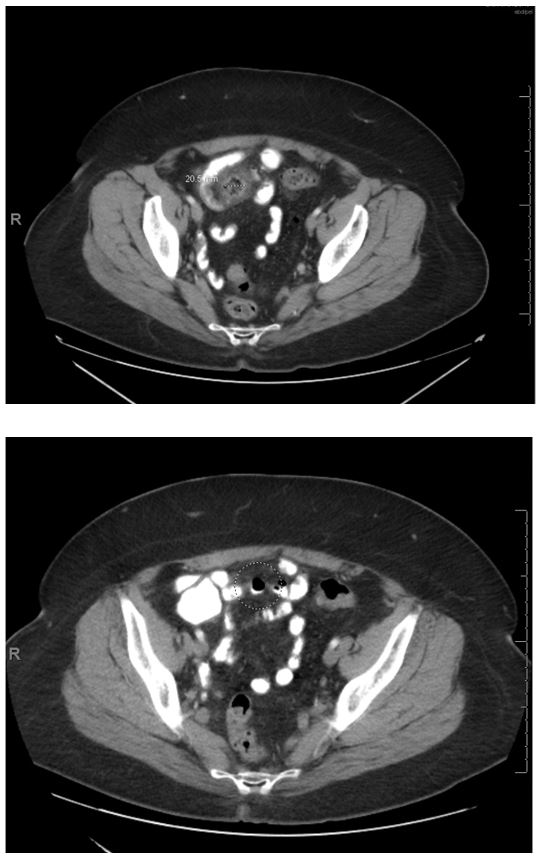Back
Poster Session C - Monday Afternoon
C0670 - Small Bowel Diverticulitis: A Unique Urinary Presentation
Monday, October 24, 2022
3:00 PM – 5:00 PM ET
Location: Crown Ballroom

Omer Chowdhury, DO
The University of Texas Health Science Center at Tyler
Tyler, TX
Presenting Author(s)
Omer Chowdhury, DO1, Sarah Siddiqui, MD1, Umair Sohail, MD2
1The University of Texas Health Science Center at Tyler, Tyler, TX; 2UT Health East Texas Physicians, Tyler, TX
Introduction: Small bowel diverticula (SBD) are rare and often discovered incidentally. Although usually asymptomatic, complications such as diverticulitis, obstruction, abscess, and perforation can occur. Given the rarity of SBD, no established treatment guideline exists. We present a case of a healthy patient with urinary symptoms who was found to have SBD.
Case Description/Methods: A healthy 54-year-old female presented to her PCP with sharp suprapubic abdominal pain with dysuria and gross hematuria. Physical examination demonstrated suprapubic tenderness upon palpation. A urinalysis and urine culture were unremarkable. However, there was concern for urinary tract infection (UTI) and patient was started on Cephalexin 500mg BID for 14 days. Two days later, patient presented to the ER with worsening symptoms. She now had associated nausea and vomiting with fever. She exhibited guarding and rebound tenderness on physical examination. A CMP was unremarkable with normal LFTs. She had a WBC count of 11.8 K/mm3. Given worsening suprapubic pain, a CT abdomen and pelvis with contrast was obtained which showed severe acute small bowel diverticulitis involving a 6 cm long distal ileal loop adjacent to the bladder. Surgery services were consulted for intervention and recommended inpatient observation and initiation of IV antibiotics. The patient refused and wished to go home. She was discharged with Ciprofloxacin 500mg BID and Metronidazole 500mg TID for 14 days. The patient was scheduled to follow up with GI clinic. A repeat CT abdomen and pelvis with contrast showed near complete resolution of the inflammatory features of small bowel diverticulitis. Patient reported retuning to her baseline health.
Discussion: Most patients with SBD are asymptomatic. However, symptoms may reflect local inflammation as seen in our patient who presented with suprapubic pain, dysuria, and gross hematuria. No established treatment guidelines exist for SBD and thus colonic diverticulitis management is used as a guide. Asymptomatic patients do not require treatment. For patients with uncomplicated SBD, management includes diet adjustment and antibiotics. For complicated SBD, as evidenced by perforation on imaging or hemodynamic instability, surgical management is often required.

Disclosures:
Omer Chowdhury, DO1, Sarah Siddiqui, MD1, Umair Sohail, MD2. C0670 - Small Bowel Diverticulitis: A Unique Urinary Presentation, ACG 2022 Annual Scientific Meeting Abstracts. Charlotte, NC: American College of Gastroenterology.
1The University of Texas Health Science Center at Tyler, Tyler, TX; 2UT Health East Texas Physicians, Tyler, TX
Introduction: Small bowel diverticula (SBD) are rare and often discovered incidentally. Although usually asymptomatic, complications such as diverticulitis, obstruction, abscess, and perforation can occur. Given the rarity of SBD, no established treatment guideline exists. We present a case of a healthy patient with urinary symptoms who was found to have SBD.
Case Description/Methods: A healthy 54-year-old female presented to her PCP with sharp suprapubic abdominal pain with dysuria and gross hematuria. Physical examination demonstrated suprapubic tenderness upon palpation. A urinalysis and urine culture were unremarkable. However, there was concern for urinary tract infection (UTI) and patient was started on Cephalexin 500mg BID for 14 days. Two days later, patient presented to the ER with worsening symptoms. She now had associated nausea and vomiting with fever. She exhibited guarding and rebound tenderness on physical examination. A CMP was unremarkable with normal LFTs. She had a WBC count of 11.8 K/mm3. Given worsening suprapubic pain, a CT abdomen and pelvis with contrast was obtained which showed severe acute small bowel diverticulitis involving a 6 cm long distal ileal loop adjacent to the bladder. Surgery services were consulted for intervention and recommended inpatient observation and initiation of IV antibiotics. The patient refused and wished to go home. She was discharged with Ciprofloxacin 500mg BID and Metronidazole 500mg TID for 14 days. The patient was scheduled to follow up with GI clinic. A repeat CT abdomen and pelvis with contrast showed near complete resolution of the inflammatory features of small bowel diverticulitis. Patient reported retuning to her baseline health.
Discussion: Most patients with SBD are asymptomatic. However, symptoms may reflect local inflammation as seen in our patient who presented with suprapubic pain, dysuria, and gross hematuria. No established treatment guidelines exist for SBD and thus colonic diverticulitis management is used as a guide. Asymptomatic patients do not require treatment. For patients with uncomplicated SBD, management includes diet adjustment and antibiotics. For complicated SBD, as evidenced by perforation on imaging or hemodynamic instability, surgical management is often required.

Figure: Figure 1 (top): CT abd and pelvis w/contrast showing large small bowel diverticulitis measuring 2.1 cm.
Figure 2 (bottom): CT abd and pelvis w/contrast showing marked improvement of the small bowel diverticulitis with near complete resolution of inflammatory changes and wall thickening.
Figure 2 (bottom): CT abd and pelvis w/contrast showing marked improvement of the small bowel diverticulitis with near complete resolution of inflammatory changes and wall thickening.
Disclosures:
Omer Chowdhury indicated no relevant financial relationships.
Sarah Siddiqui indicated no relevant financial relationships.
Umair Sohail indicated no relevant financial relationships.
Omer Chowdhury, DO1, Sarah Siddiqui, MD1, Umair Sohail, MD2. C0670 - Small Bowel Diverticulitis: A Unique Urinary Presentation, ACG 2022 Annual Scientific Meeting Abstracts. Charlotte, NC: American College of Gastroenterology.

